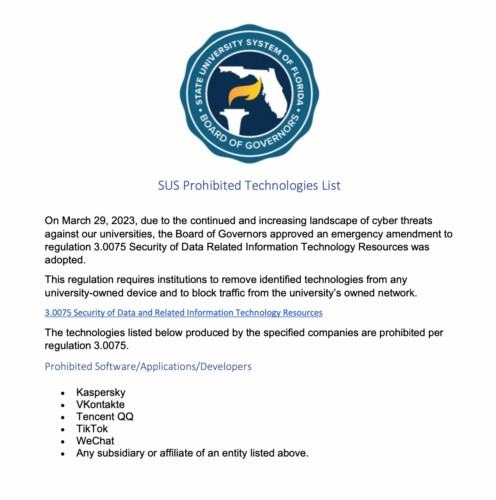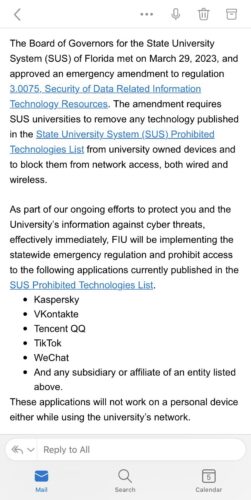Florida state universities ban TikTok and WeChat from campus networks
Chinese students on college campuses in Florida won’t be able to WeChat home from now on.

Yesterday, students at public universities across the state of Florida received an email notifying them that various apps including TikTok and WeChat would be banned from all devices using a university WiFi network.
The decision was made by The Board of Governors for the State University System (SUS) of Florida during meetings which took place from March 28 to 29. This means that all colleges funded by the Florida state government will prohibit student from using school wifi to access TikTok, WeChat, Tencent QQ, and the Russian apps VKontakte and Kaspersky and any of their subsidiaries or affiliates.

Screenshot of notice sent out by The Board of Governors for the State University System of Florida
The decision also means that in the future, the chancellor of the State University System of Florida will have a precedent for blocking access to websites and social media platforms deemed to threaten personal privacy and national security.
A key mover behind the decision is Board of Governors member Alan Levine. His day job is as chairman and Chief Executive Officer of Ballad Health, an integrated health system serving the Appalachian region, voiced concerns about how TikTok could be a threat to university research.
Levine pointed to other universities in Arkansas, Montana, and Texas that had enacted similar bans. He also shared his own anecdote of being involved in the firing of six researchers at Florida’s Moffitt Cancer Center, including the CEO, because they had been linked with China’s controversial Thousand Talents recruitment program.
“When you think about the potential dangers to students and their data and the potential dangers to our faculty and the work and the labor they have put into research and the danger to taxpayers of the theft of that research. All of this together means we probably need to have a policy state wide,” Levine said regarding TikTok at the January board meeting.
Chinese students worry about talking to family
The banning of WeChat on college campuses in Florida is worrying for the many Chinese students attending college in the state.
In 2020 there were as many as 398,041 Chinese students in the United States, and thousands of them call Florida a second home. A ban on WeChat will make it tough to talk to family, because many students rely on campus WiFi networks to connect to the internet rather than expensive cellular data plans.
One Chinese student, who is studying law at Florida International University (FIU) and has asked to be anonymous, shared how sudden the decision was. “We were completely surprised. I didn’t know anything had happened until yesterday when I wasn’t able to log into my WeChat in the campus library. It wasn’t until I got home that I saw the email.”

Screenshot of email sent to FIU students on April 5, 2023
Chinese students have begun writing to the heads of their universities in an attempt to express the challenges this ban could pose, but the decision will be difficult to repeal as it falls in line with a larger drive statewide beyond Florida’s colleges and universities. On February 15, Governor Ron DeSantis announced a proposal to ban TikTok and other social media platforms associated with China on any government-issued device or network across Florida through a “digital bill of rights” for Floridians.
While the proposed bill could give consumers more rights over their personal information online, including the ability to opt out of having their data shared or sold, there are concerns that it gives the government too much power over social media.
DeSantis has his own agenda when it comes to the bill. He has accused companies of manipulating search results for political “agendas” and “narratives.” One example he uses is the “censoring” of those who “dissented from the Fauci narrative” in regards to COVID. TikTok and other Chinese owned applications fall under this concern, with the added looming “threat” of communist influence.






